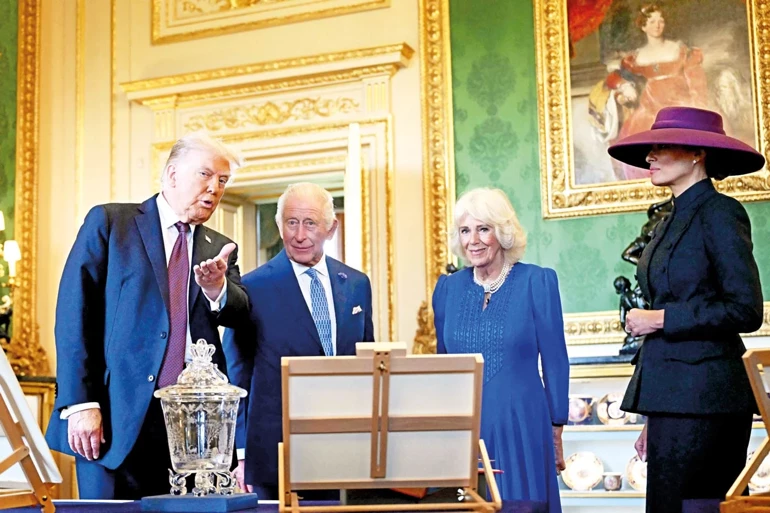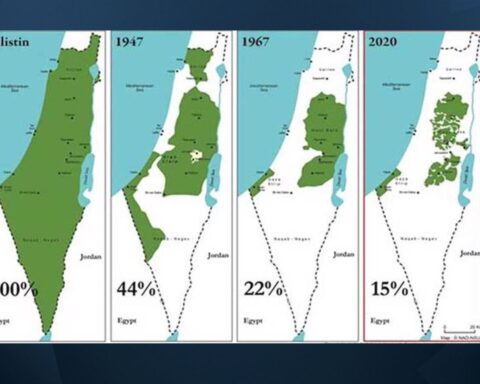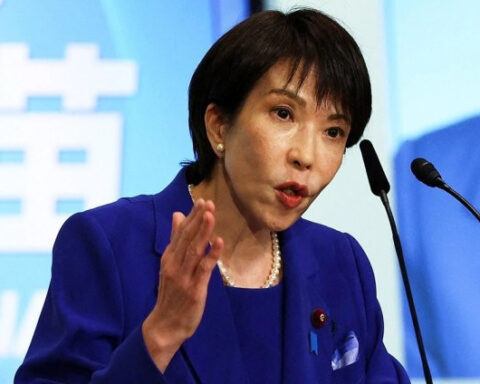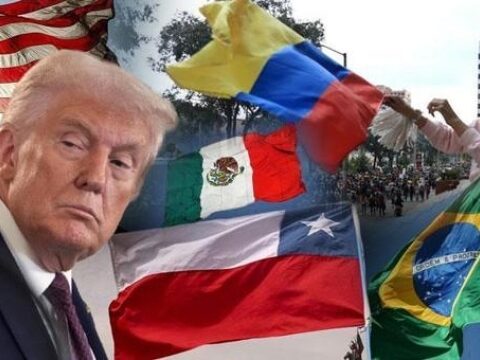At Westminster, President Trump can cement his legacy in Europe by making NATO unassailable and warning the Kremlin: Leave Ukraine alone.
President Donald Trump’s sincere desire for peace in Ukraine is laudatory. His chances of achieving it are advanced not by courting Putin, but rather by standing firm. Trump, both in person and through symbolic gestures, has been more accommodating of Putin than any other US president, with very little to show for it. It’s time to change tack and take a cue from Ronald Reagan, who asked Gorbachev to “tear down the (Berlin) wall” and got it done. Reagan is the only US president to engage a Soviet or Russian head of state and achieve a desired result. Trump can be the second by looking Putin in the eye and stating, “Leave Ukraine alone or face consequences.”
Putin is at best an unreliable partner and a manipulative deviant. He has made an art of manipulating US presidents. He let President George W Bush “get a sense of his soul.” He lulled Obama into disparaging Mitt Romney when the latter suggested Russia as America’s greatest threat, and followed by dispatching Lavrov to make a fool of Hillary Clinton’s “Reset.” He convinced Trump in Helsinki to accept the Kremlin’s assessments over those of his own US national security staff. He riddled the Biden White House with fear of escalation, forcing it to resort to congenital bouts of half-measures and rethink arming Ukraine to defend its territories.
Recently, President Trump went to Alaska, determined to secure a ceasefire, only to return repeating Putin’s desire for a full peace deal instead. Putin’s subterfuge of American presidents is only surpassed by his mockery of a long line of European counterparts—Angela Merkel, Olaf Scholz, and Emmanuel Macron in particular.
Treasury Secretary Scott Bessent recently gave voice to a fact known to every foreign policy realist in America and Europe:
President Putin, since the historic meeting in Anchorage, since the phone call, when the European leaders and President Zelensky were at the White House…has done the opposite of following through on what he indicated he wanted to do. As a matter of fact, he has, in a despicable, despicable manner, increased the bombing campaign.
President Macron acutely observed that Putin is playing the president for a fool. Trump’s deadlines come and go, just like Obama’s red lines in Syria. While Putin meets with Xi and Kim in China, European Commission President Ursula von der Leyen toured Europe’s frontline states, from Finland and the Baltic countries to Poland, Bulgaria, and Romania. Unlike yesteryears, the US president or his secretaries of defense or state have yet to undertake a similar show of solidarity.
President Trump has the option to either continue to be led down the Putin alley like his recent predecessors or emulate the one exception, Ronald Reagan, and bend the evil empire to his will. Trump can draw a line in the sand and bestride it as a colossus. Trump’s legacy and that of his movement of making America great again depend on it.
President Trump can signal this change immediately with two rhetorical adjustments. He should stop chiding Ukraine to make peace with Russia. He may do better in reminding Russia that American stinger missiles on ragged but resolute Afghan shoulders brought the great Soviet empire tumbling down.
Moreover, the American colonies, in taking on the might of Britain, were underdogs much like Ukraine, but they were victorious nonetheless. Even when brutal empires were able to quash brave martyrs, the victory was fleeting and ultimately led to the dissolution of the marauding invaders. This holds true from Thermopylae to the Alamo to the muddy fields along the Dnieper River. The cause of liberty and the defense of one’s homeland matter more than the size of the invading adversary.
President Trump’s peace efforts would also be better served if he jettisoned his ineffectual attempts to act as a neutral arbiter between the marauding Kremlin and the righteous Ukraine. Ronald Reagan’s America, the shining city on the hill, shone brightest when standing with democracies, however small, over autocracies, however large. Democratic Ukraine is in the right in defending its homeland from the unprovoked Russian invasion.
American interests in Europe are far better served with a secure and sovereign Ukraine than a rehabilitated Russia occupying Ukrainian territory. A free Ukraine would be a resolute and obliged ally boasting the largest battle-hardened army in Europe. It would present a highly remunerative investment opportunity for American capital and expertise in rebuilding its digital, mineral, energy, nuclear, and agricultural industries. Ukraine would join NATO with a defense commitment well in excess of 5 percent of its GDP.
Conversely, rehabilitating the Russian petrostate would amount to a self-inflicted wound on Trump’s global strategy to make America the first-choice energy supplier of Europe and Asia. It would also free Russia to create mischief contrary to US interests in the South Caucasus, the eastern Mediterranean, Central Asia, the North Pacific, Africa, and South America.
US interests and Putin’s prevarications suggest that Trump’s legacy would benefit more from taking a firm stance with the Kremlin. Trump’s upcoming state visit to the United Kingdom (September 17–19) offers a timely venue to launch a tactical shift. Though he will not have the opportunity to address both Houses of Parliament, an address in the UK could be the defining speech of his presidency, meeting the high standard of Reagan’s peroration at Westminster and the Brandenburg Gate. Trump would be on firm ground in explaining that he made a good-hearted effort to entreat Putin to peace, all to no avail. It is time for firm resolve and a decisive riposte.
Trump demonstrated leadership by convening Ukraine and European nations at the White House to develop a unified position for negotiating with Putin and establishing security guarantees for Ukraine. He should build upon it in his upcoming speech in the UK to establish the White House gathering as the Ukraine Support Group that would meet quarterly to strategize on allied support for Ukraine’s efforts to reclaim occupied territories. He should invite Japan, Australia, and India to join the gathering. India’s participation in the Group would be a welcome development, distancing it from the present ill-timed and ill-conceived contretemps concerning tariffs and Russian oil purchases.
Trump, in his September speech, can rightly claim to be the US president most responsible for revitalizing history’s most consequential military alliance—NATO. After recently doling out deserved tough love, Trump should also acknowledge American gratitude to NATO nations for invoking Article 5 response after the 9/11 attacks in New York and sending their sons and daughters to Afghanistan. Denmark, in particular, has suffered the greatest per capita loss of life in Afghanistan of any other allied nation after the United States.
Now it is Trump’s time to lead the way and imbue NATO with a resolute purpose of not only facilitating the defense of Ukraine but also making the nation whole again. A strong September declaration by Trump would send a deafening signal to the Kremlin and one louder still to the Chinese Politburo and stiffen spines in Taipei. It would buttress security not only in the North Atlantic but also across the Indo-Pacific, catalyzing the Quad nations to greater investment in their respective militaries and to greater collaboration among their defense forces.
History beckons Trump to seize his Reagan moment in London. A stern warning to Russia to “leave Ukraine alone” and a call to mobilize the military and industrial resources of Europe and NATO will adjudge President Trump as the president who revived Europe in the twenty-first century.
*About the Author: Kaush Arha
Kaush Arha is President of the Free & Open Indo-Pacific Forum and a Nonresident Senior Fellow at the Atlantic Council and the Krach Institute for Tech Diplomacy at Purdue.
Source: https://nationalinterest.org/feature/donald-trumps-uk-state-visit-could-be-a-reagan-moment






